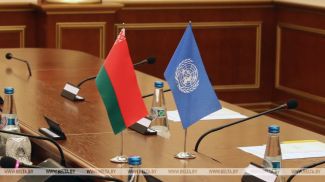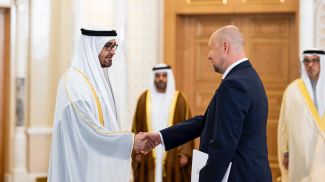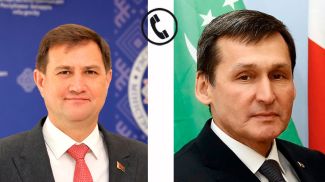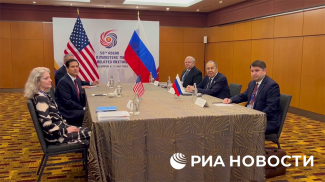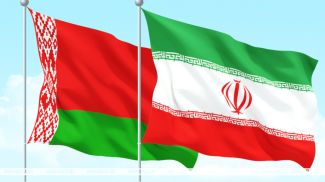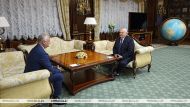MINSK, 24 May (BelTA) - Belarus and the EU are close to signing an important package of agreements: on visa facilitation and readmission, Belarus Deputy Minister of Foreign Affairs Oleg Kravchenko said at a reception to celebrate Europe Day arranged by the EU Delegation to Belarus in Minsk on 23 May, BelTA has learned.
The official touched upon another important document - the Partnership and Cooperation Agreement (PCA). “Defining the long-term objective in relations may be easier for Belarus than other countries as it does not seek EU membership. Shaping the strategy for the next 10 to 20 years can help solve important yet tactical tasks that do not always get enough of our attention,” said Oleg Kravchenko. “I am sure that the parties can find a way to start negotiations on the Partnership and Cooperation Agreement. Even with the negotiation process taking the most favorable course, it will take months at least,” the deputy minister added.
“We, Belarus and the EU, need at least some basic legal framework to regulate our relations. The Partnership and Cooperation Agreement does not redefine the relations. It does not imply any preferences or allocation of substantial financial resources. Its value, in the context of the Belarusian-European relations, is mostly that of a symbol and a signal of the full normalization of relations. The EU has such a framework with all the countries in the region. I see no insurmountable obstacles for us to start the negotiations. If we are moving to a higher level of relations, which was impossible just a few years ago, then why can't we start negotiations on the very basic agreement that creates a modest yet useful basis for both parties in the relations,” Oleg Kravchenko said.
In connection with the celebration of Europe Day, he recalled that initially the idea behind the European Union was to prevent wars between Germany and France. “If you could overcome centuries-old Franco-German discord, then dialogue and partnership between the EAEU and the EU must be possible too. It will benefit the economies and will help minimize the conflict potential in the region,” the deputy minister said.
In his view, the historical lessons need to be learned and used. “There is no need to wait for our shared European continent to degrade to the state similar to the post-WW2 period in order to understand the need to create common economic interests as a factor of preventing new clashes,” Oleg Kravchenko noted.
Interpersonal contacts are an important part of the Eastern Partnership agenda, he recalled. “When people going to the EU by car, have to spend six to ten hours crossing the EU border, it does not help further this agenda. This is inconvenient for people, bad for business. Let the first project that will kick off the second decade of the Eastern Partnership, deal with some simple things, like reduction of time on the border to one hour, rather than something ambitious which will take us years to implement. This is possible. Many more people undergo the same procedures in airports within minutes. Alongside other important projects, this move could become the best testimony to the Eastern Partnership initiative being people-oriented,” Oleg Kravchenko said.
“We are close to signing the visa facilitation agreement. This is important. Given the EU's decision to raise the visa fees, we are in talks to keep the visa fees for Belarusians virtually at the current level and even slightly reduce them. There is no doubt that visa rules will be facilitated. We are doing our best to make travelling to Belarus as easy and cheap as possible for nationals of the EU and other states,” Oleg Kravchenko said.
Unilateral initiatives do not imply automatic reciprocal steps. Oleg Kravchenko believes that Belarus' unilateral move can make a good basis for further joint progress towards facilitating entry rules for EU citizens travelling to Belarus and for Belarusians visiting the European Union.
“The things I have mentioned are just part of our frequent and lengthy talks with my colleague, Head of the EU Delegation to Minsk Andrea Wiktorin. We do not see eye to eye on everything. I think this is not possible, even between the closest allies. There is still a lot of work ahead of us in normalizing the relations and launching Belarus-EU partnership. Our joint efforts are always aimed at positive results, new achievements that will benefit people, bring Belarus and the EU closer to each other, and ensure stability in the region. They never ever aim to set off our traditional alliances. Andrea Wiktorin has done a lot, including by her personal example, to restore gradually the trust between Belarus and the EU,” Oleg Kravchenko said.




